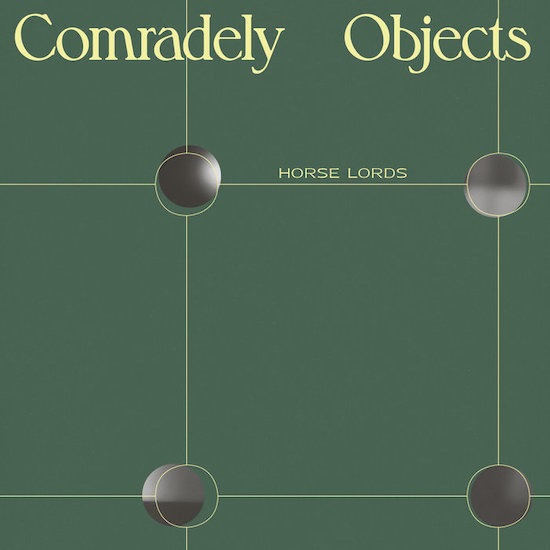The music of Horse Lords – a four-member ensemble from Baltimore, majority German-located since latest album Comradely Objects was recorded – is borne of discipline and even scholarly tendencies, but glows with untapped possibility and thrives on flouting convention. Invoking genre in any description of these seven instrumental pieces will serve its purpose, in a shorthand way (which is why I’m going to do it), but should come in each case with an implied footnote that the group are powerfully resistant to tropes, perhaps more so now than on their previous, generally also excellent records.
Comradely Objects is, in Horse Lords’ telling, a more studio-assembled record than late-2020 predecessor The Common Task, but the result is less ‘digital’ in sound. The one standout moment for anyone invested in tracking their relationship to club music (especially after TCT), comes with the intro to ‘Mess Mend’, where a joyous Korg melody of an early-’90s piano house ilk plays itself out before rapidly mutating into something more bluegrass-adjacent – a guitar, tuned by Owen Gardner to sound remarkably like an electrified banjo and locking into a tense, dense trance as Max Eilbacher folds in acidic electronic hiccups. Horse Lords’ interest in "rural American guitar and banjo styles" (Gardner’s words when I interviewed the band five years ago) is a matter of record, but this deployment of them is a fine new horizon.
The latter stages of ‘Law Of Movement’, Comradely Objects‘ longest track, laser in on the interplay between Eilbacher, on bass, and drummer Sam Haberman (the sole Horse Lord not to move to Germany). I think, perhaps laterally, of the more rhythmically innovative mnml scene of the ’00s: maybe this could have served a purpose in some aeon-long Ricardo Villalobos set back when? Certainly, this would involve bypassing the sawing bass/pre-civilisation post-punk/a more doolally Can that comprises the first seven or eight of this number’s ten minutes.
Horse Lords’ adherence to repetition, and hypnotic states achieved through same, is such that a deviation from this, ‘May Brigade’, seems almost implausible in context. It’s initially effervescent, driven by Andrew Bernstein’s post-punk-toned saxophone, but this is a misleading lull for a composition which I don’t think is at any point ‘free’ in its arrangements but does bear comparison with free jazz, as well as an act like Faust. A rare height of cacophony for this band, certainly.
Bernstein is again central to the energy of ‘Rundling’ and ‘Zero Degree Machine’ – on both, his playing has a weathered feel I associate with Ethiopian jazz; if you happen to like Getachew Mekuria & The Ex’s collaborative Moa Anbessa LP, I think this one might be your bag. Often structurally intricate, Comradely Objects‘ final composition, ‘Plain Hunt On Four’, is reputedly too tricky to attempt live. Certainly, the manner in which its drums hopscotch around loop-de-loop woodwind seem to involve time signatures beyond the admittedly limited ken of rapt amateurs like the one reviewing this.


